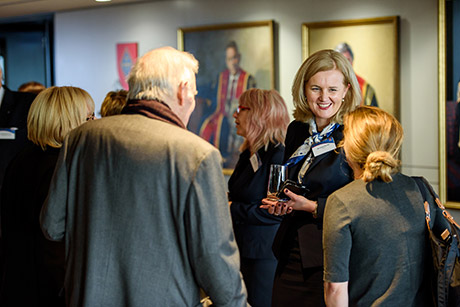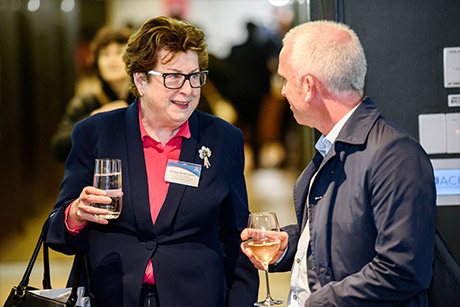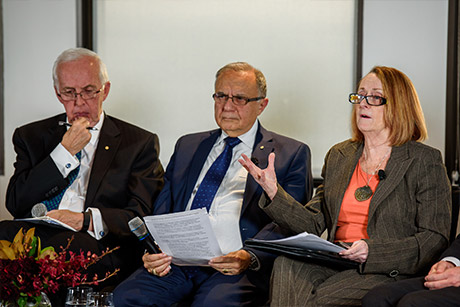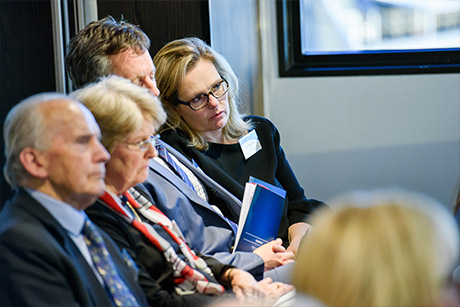13 Oct, 2016
10 mins
Director's remarks at the Launch of the PM Glynn Institute
I am deeply grateful to the Vice-Chancellor, Professor Craven, for his introduction. It is now my task to talk briefly about how the Institute will bring this vision to life.
With the Vice-Chancellor’s support, the PM Glynn Institute has been established to contribute to deeper thinking about over-the-horizon issues, and how these might play out in the future. It is a task directed to supporting the contribution that the Catholic community and its various services and organisations make to our country, especially through education and healthcare. Just as importantly, it will also address questions and concerns which are important to Australians and Australia as a whole. In a number of areas, important issues facing the Church are a sub-set of important issues facing government and society.

For example; how much scope should be given to religion in diverse, secular democracies? Some would prefer to confine this space pretty narrowly. This poses a major challenge for religious communities which provide services to everyone and want to do so in a way that is consistent with the religious inspiration and beliefs that lead them to take on these works for others in the first place. How this question is answered is a concern for the Catholic community.
But the question is much bigger than this. Australia is an increasingly secular country, and along with other countries like ours we are swimming against the tide. The world is becoming more religious, not less, while our own basic assumptions and understandings of how life works are becoming more secular. It is not going to be a good fit. Public policy will need to broaden its focus significantly if it is to successfully engage with what this reality entails.

This requires thinking about religion and the life of faith in a similar way to how we think about (for example) the economy: as a powerful influence in shaping people’s lives and behaviour, as an important factor for understanding how modern societies work, and as an enduring part of the social and political landscape.
Another example is human rights. A commitment to human rights is an indispensable part of a free society. There has always been, and will continue to be, intense discussion about the meaning and reach of particular rights, and widely differing interpretations about their implications. Even so, in a diverse and complex society like ours support for human rights is meant to be common ground. How confident are we that this will continue to be the case?
For the Catholic community and other religious groups, a steady and relentless pressure is being brought to bear to gradually redefine and narrow down the meaning of religious freedom and freedom of conscience in a way which can only be described as exclusionary. There is an increasingly influential view in societies like ours that people who hold beliefs — religious or otherwise — which run counter to particular perspectives on sexuality, identity, equality, or on beginning and end of life issues in healthcare, should be excluded from providing services to the community, and even from studying for or practising certain professions.

Other important rights for the community more generally are also affected, such as freedom of speech, freedom of belief, and freedom of association, which can be seen in the use of speech codes, “safe spaces” and “no platforming”, and semi-soft forms of intimidation and harassment pursued through anti-discrimination tribunals and social media.
Even more worrying are the attempts to redefine human dignity not as an inviolable given for everyone, no matter how lowly or vulnerable, but as something which we qualify for and are disqualified from depending on our age and health, our capacity to reason or understand, and even on the environmental and social costs of our existence.
These issues raise particular concerns for the Catholic community, but they do not stop there.
A final example is the theme for our panel discussion tonight. Despite all the good things we have going for us in Australia, hope and confidence in the future sometime seem to be in short supply. Trust in institutions is declining and we are disenchanted with the way politics and public debate are practised. In many areas there are significant problems and no real clarity on how we might come to grips with them. Some people are disengaging, but not necessarily with serenity. Voices appealing to anger and disaffection are resonating more strongly.
Patrick McMahon Glynn was a constitutional lawyer who helped lay the foundations for the Australian achievement, and his character and approach — independent, generous, focussed on people and the future — resonate with the aims of the Institute.
Carl Schmitt was a distinguished German constitutional lawyer, but of a very different kind to Glynn. Once it was clear that the Weimar constitution could not prevent the Nazis from taking power, he threw his lot in with them. In his political philosophy, Schmitt argued that there is a fundamental distinction at the heart of politics, just as there is in economics (between profit and loss), and morality (between good and evil). For Schmitt, the fundamental distinction in politics is between friend and enemy.

Schmitt’s concept of politics is completely at odds with the idea of a free society based on shared landscapes, on a life together which is genuinely held in common. This idea bases politics and the common good on friendship; on the respect for moderation to which friendship directs us, and on the art of disagreement in which it forms us. But the way we argue about some important issues today — as a zero-sum game, where the idea is that for me to win you must most certainly lose — sometimes feels like we are trying to prove that Schmitt was right.
Schmitt’s proposition about politics needs to be disproved. We need to re-discover the idea of life in common as a shared landscape, adjust the thresholds so that instead of seeing the person who disagrees with us as an enemy with a malign intent which must be unmasked, we see them as a friend with a different, deeply-held view about the good thing to do.
Tackling these very different sorts of issues, and other issues as well, will be the work of the PM Glynn Institute; drawing on the expertise we have at ACU, being prepared to follow the evidence wherever it leads, and bringing some imagination to develop and try some new approaches. This will not be a particularly easy task, but with your support and encouragement, we will see what we can do.
